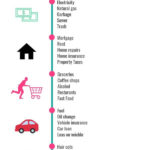- Home
- Money Management
- Money Saving Tips
- 71 budget categories you might ...

Having a budget is key to this financial success!
Have you ever started a budget without using categories? If so, I’m guessing it wasn’t easy. If you leave out the categories when budgeting, your entire budget will be thrown away!
Creating a budget that uses categories allows us to tell our money where to go before we even get our hands on it, which is key to your success.
If you want to create a flawless budget, start using budget categories every month.
What is a budget category?
A budget category is an umbrella term for the different areas of your budget that you need to track to keep your finances under control.
Each of these categories has its own purpose and requires different strategies depending on your financial goals.
Each of these categories is specific to your savings and spending goals. Your budget categories will likely look completely different than the budget categories of your friends or family members.
How do budget categories work?
Budgeting by category is a great way to keep your finances organized. Choose categories based on your monthly wants and needs. Then allocate the money to each category for each paycheck.
You can add new categories or remove some each pay period. We are adding new categories related to holidays and birthdays. Once the holidays are over, we will remove them from our budget until the next opportunity.
Once your money is gone in each category, you must stop spending until you are able to replenish that category.
If you’re ready to start budgeting or need a place to keep track of your budget, be sure to get ours FREE printable budget binders below.
Get your FREE budget binder today!
Start saving more money and pay off your debt with this FREE budget organizer
What categories should I use in the budget?
As I mentioned above, the best part about choosing budget categories is that it is completely based on your lifestyle and needs. Everyone has different wants and needs, so everyone’s categories will be different.
Your interests are probably completely different than mine. Therefore, your categories will be different than mine, and that’s perfectly fine.
How specific should you make your budget categories?
How specific you create your budget categories depends on how detailed and organized you want to be with your finances. You can choose to implement broader budget categories, such as:
- Bills of exchange
- Food
- Entertainment
- Gas money
- Mortgage
By using broad categories, you can have more control and understand where your money is going without being too detailed. For example, your account category would cover all of your accounts each month.
However, if you want to be ultra-organized and focused on tracking your spending down to the penny, then you may want to use specific categories such as:
With these specific categories, you can accurately track your spending and ensure that every dollar is spent in the right place.
No matter what type of budget category you choose, make sure they help you stay on track with your financial goals.
95 Budget categories List

Below, select the budget categories that you think are appropriate for your household needs. Then write down your budget using categories and make sure you include all expenses.
Remember that you can break each of these down into broad categories like services, home, and entertainment, or you can break things down and make subcategories as well, like listing each service or bill, etc.
Utilities
1. Electricity
2. Natural gas
3. Garbage
4. Water
5. Sewage
6. Basket
7. Cable
8. Heating
9. Telephone
10. Recycling
Home
11. Mortgage repayments
12. Lease/Mortgage
13. Repairs
14. HOA Fees
15. Alarm system
16. Property Taxes
17. Rent Insurance
18. Household insurance
19. Remodeling the house
20. Property Taxes
21. Lawn/Garden Care
22. Home improvement fund
Food expenses
23. Food
24. Restaurant
25. Alcohol
26. Costco/Sams Club
27. Cafes
28. Fast food
29. Working lunches
30. School lunch
household goods
31. Cleaning products
32. Toiletries
33. Tools
Transportation
34. Gas/Fuel
35. Vehicle maintenance
36. Payments by car
37. Oil change
38. Vehicle insurance
39. Tolls
40. Parking charges
41. Vehicle registration and bookmarks
42. Vehicle rental
43. New tires
Personal care
44. Hair cutting
45. New clothes
46. Salon and Spa
47. Chiropractor
48. Gym Membership
49. Holidays
50. Fun money
51. Make-up / cosmetic products
52. Subscriptions (magazines, applications, etc.)
53. Co-payment/out-of-pocket medical expenses
Entertainment
54. Movies
55. Nanny
56. Make-up
57. Salon
58. Hobbies
59. Streaming services (Netflix, Spotify, etc.)
60. Date Nights
61. Family activities (bowling, zoo, etc.)
62 subscriptions (magazines, apps, etc.)
Children
63. Extracurricular activities
64. Toys
65. School supplies
66. Contribution
67. Care of children
68. Nanny
69. Children’s higher education fund
70. School supplies
71. Field trips
Medical care
72. Doctor’s visits
73. Eye appointments
74. Urgent care visits
75. Regulations
76. Glasses and contacts
77. Vitamins
78. Accessories
79. Hearing aids
80. Visits to the dentist
81. Health insurance
82. Dental insurance
83. Over-the-counter medicines
84. Therapy/Counseling
Savings account
85. 401 thousand
86. Roth IRAs
87. Mutual funds
88.. Index funds
89. Contingency fund
90. Life insurance
91. Repayment of debt
92. Holidays
93. Health Savings Account (HSA)
94. Down payment fund (house, car)
95. General savings
Budget categories – final thoughts
With the right budget categories, you’ll be able to make sure your finances are in line with your goals. Everyone has different financial needs and these categories can help meet those needs. From setting aside money for travel to making sure you’re saving for retirement, the right budget categories will ensure you can maintain financial security and peace of mind.
Whether you’re just starting out on your budgeting journey or have been on it for a while, it’s always important to review your current system and see what new areas of budgeting might benefit you.
While some parts of budgeting can seem tedious, having all of your income and expenses information at your fingertips makes it easier than ever to start managing your money responsibly and helps protect you from potential financial pitfalls in the future.
Ready to start budgeting?
Budgeting can be overwhelming, especially if you’re just starting out. The good news is that you don’t have to figure this out on your own. Our free budget planner is the perfect tool to help you get on track with your finances. Whether you’re trying to save money for a down payment on a house or trying to get out of debt, this budget binder will help you organize your finances and keep track of your spending.
With easy-to-use printable templates for tracking spending and setting financial goals, our budget binder is packed with everything you need to start reaching your financial goals. Don’t wait any longer to take control of your finances. Grab ours free budget binder below and get started today!




![What is a Sinking Fund? A Complete Guide [+ How I Use Them]](https://zarffoute.com/wp-content/uploads/2024/11/What-is-a-Sinking-Fund-A-Complete-Guide-How.webp-150x150.webp)

![What is a Sinking Fund? A Complete Guide [+ How I Use Them]](https://zarffoute.com/wp-content/uploads/2024/11/What-is-a-Sinking-Fund-A-Complete-Guide-How.webp.webp)



No Comments